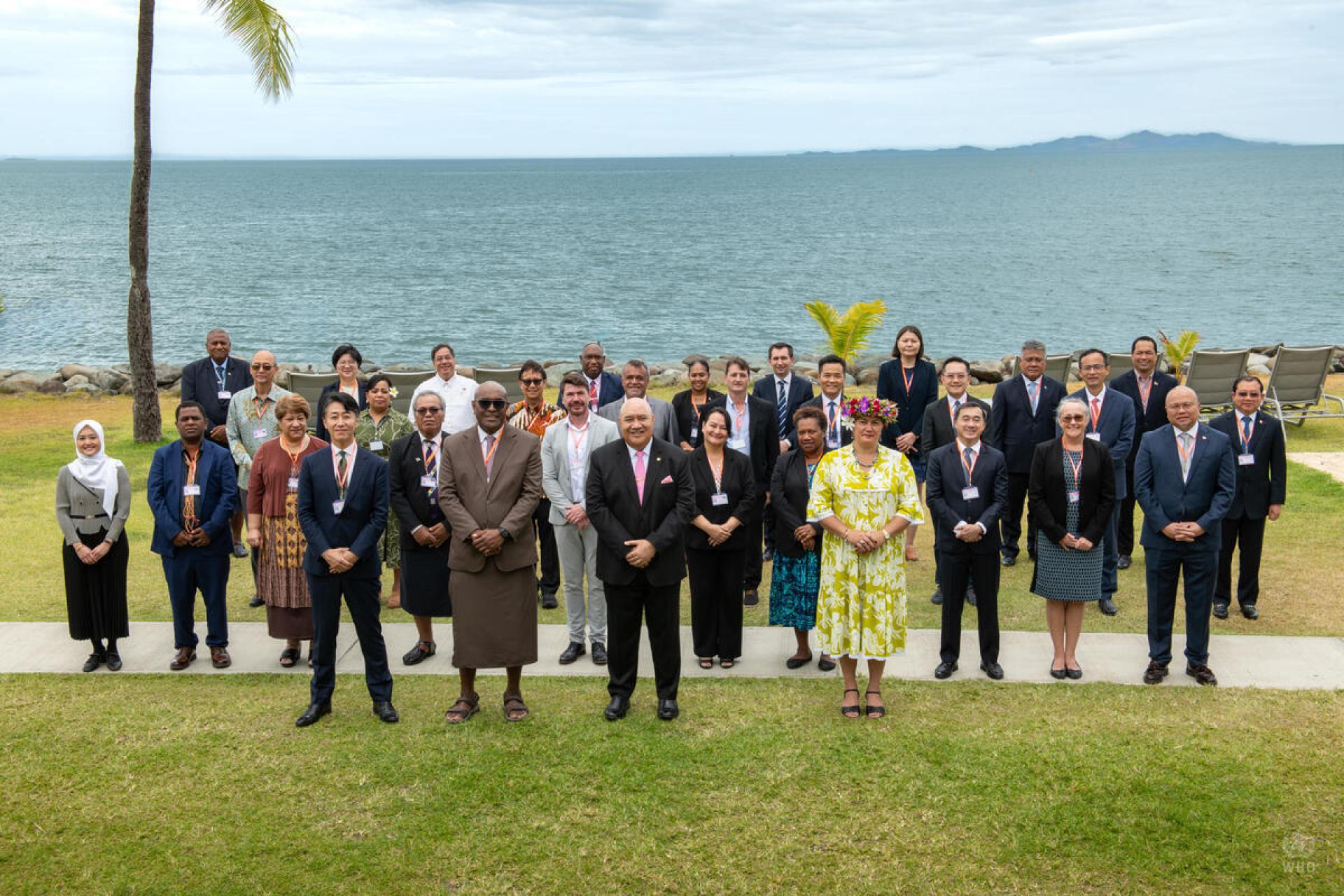(Bandar Seri Begawan, 24th) Health ministers and representatives from 38 member states of the World Health Organization (WHO) Western Pacific Region (WPR) are attending the 76th session of the WPR Regional Committee meeting in Nadi, Fiji, which will be held from October 20 to 24, 2025.
The Brunei delegation is led by Minister of Health Dato Isham, with several senior officials from the Ministry of Health accompanying him.
The 76th meeting is chaired by Fiji’s Minister for Health and Medical Services Dr. Ifereimi Waqainabete, focusing on current health issues, policies, planning, and future directions of the WHO Western Pacific Region. Discussions include reviewing the report of the WPR Regional Director, planning allocation, and project implementation.
Priority areas discussed include monitoring the development of health issues and projects and coordinating work regionally. This year’s 76th meeting focuses on technical topics such as: transforming mental healthcare to meet global challenges; climate change and the safety and resilience of health systems; implementation of amendments to the International Health Regulations (2005); oral health; and alcohol control.
Additionally, the meeting introduced policy, management, and implementation issues related to WHO’s mission, reviewed implementation reports for the 2024–2025 and 2026–2027 planning allocations, as well as progress reports on other technical programs.
During the meeting, Brunei’s Minister of Health Dato Isham, when commenting on the WPR Regional Director’s report, welcomed the innovative approaches found in the 2024–2025 Regional Director’s Report, especially the introduction of country-specific indicators that enable countries to measure their own health progress, learn from other member states, and identify areas where WHO can better support their efforts.
Furthermore, Brunei welcomes the Regional Director’s proposed vision of "Building Family, Community, and Societal Health Systems in the Western Pacific Region (2025–2029)", which places Universal Health Coverage (UHC) as the foundation of health service systems, with emphasis on strengthening basic healthcare, surveillance, and preparedness for public health emergencies, to ensure that health services can effectively respond to disease outbreaks, climate change, and any emergencies.
The minister also stated that Brunei is committed to upholding the "Pandemic Agreement" agreed at this year’s World Health Assembly, including further discussions on the “Pathogen Access and Benefit Sharing Annex” and action on amendments to the International Health Regulations to strengthen prevention and more equitable response capabilities in the Western Pacific Region.
Moreover, multi-sectoral cooperation is being strengthened to address issues such as antimicrobial resistance and zoonotic diseases; nutrition is promoted and non-communicable disease prevention is advanced through the development of the Maternal, Infant, and Adolescent Nutrition Strategic Plan (2025–2030).
In addition, Brunei is leveraging digital health technologies through the BruHealth 5.0 application to empower individuals, strengthen surveillance, and integrate preventive healthcare. During his stay in Fiji, Dato Isham paid courtesy visits to Fiji’s Minister of Health and Medical Services Dr. Ifereimi Waqainabete and Indonesia’s Minister of Health Budi Gunadi Sadikin, exchanging views and discussions on the development of each country’s health sector and regional health issues.
The Brunei delegation is led by Minister of Health Dato Isham, with several senior officials from the Ministry of Health accompanying him.
The 76th meeting is chaired by Fiji’s Minister for Health and Medical Services Dr. Ifereimi Waqainabete, focusing on current health issues, policies, planning, and future directions of the WHO Western Pacific Region. Discussions include reviewing the report of the WPR Regional Director, planning allocation, and project implementation.
Priority areas discussed include monitoring the development of health issues and projects and coordinating work regionally. This year’s 76th meeting focuses on technical topics such as: transforming mental healthcare to meet global challenges; climate change and the safety and resilience of health systems; implementation of amendments to the International Health Regulations (2005); oral health; and alcohol control.
Additionally, the meeting introduced policy, management, and implementation issues related to WHO’s mission, reviewed implementation reports for the 2024–2025 and 2026–2027 planning allocations, as well as progress reports on other technical programs.
During the meeting, Brunei’s Minister of Health Dato Isham, when commenting on the WPR Regional Director’s report, welcomed the innovative approaches found in the 2024–2025 Regional Director’s Report, especially the introduction of country-specific indicators that enable countries to measure their own health progress, learn from other member states, and identify areas where WHO can better support their efforts.
Furthermore, Brunei welcomes the Regional Director’s proposed vision of "Building Family, Community, and Societal Health Systems in the Western Pacific Region (2025–2029)", which places Universal Health Coverage (UHC) as the foundation of health service systems, with emphasis on strengthening basic healthcare, surveillance, and preparedness for public health emergencies, to ensure that health services can effectively respond to disease outbreaks, climate change, and any emergencies.
The minister also stated that Brunei is committed to upholding the "Pandemic Agreement" agreed at this year’s World Health Assembly, including further discussions on the “Pathogen Access and Benefit Sharing Annex” and action on amendments to the International Health Regulations to strengthen prevention and more equitable response capabilities in the Western Pacific Region.
Moreover, multi-sectoral cooperation is being strengthened to address issues such as antimicrobial resistance and zoonotic diseases; nutrition is promoted and non-communicable disease prevention is advanced through the development of the Maternal, Infant, and Adolescent Nutrition Strategic Plan (2025–2030).
In addition, Brunei is leveraging digital health technologies through the BruHealth 5.0 application to empower individuals, strengthen surveillance, and integrate preventive healthcare. During his stay in Fiji, Dato Isham paid courtesy visits to Fiji’s Minister of Health and Medical Services Dr. Ifereimi Waqainabete and Indonesia’s Minister of Health Budi Gunadi Sadikin, exchanging views and discussions on the development of each country’s health sector and regional health issues.
